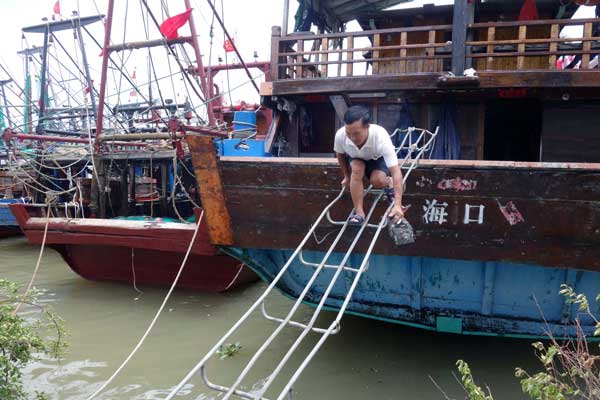Tropical storm bulks up for touchdown
Tens of thousands of ships were called back to port in coastal cities of southern China on Friday as Tropical Storm Chebi approaches Hainan and Guangdong provinces, bringing severe winds and torrential rains.
"Chebi is expected to build into a strong tropical storm on Friday, gathering strength over the South China Sea," said Gao Shuanzhu, chief typhoon forecaster at the National Meteorological Center.
 |
|
A fisherman leaves his boat after it was called back from a trip due to a typhoon alert issued by meteorological authorities on Friday. More than 20,000 fishing boats in Hainan province were instructed to return to harbor.HUANG YIMING / CHINA DAILY |
The center issued a yellow typhoon alert on Friday, predicting Chebi to touch down in Hainan or western Guangdong on Friday evening.
The meteorological authority uses a four-tier color-coded weather warning system, with red being the most severe, followed by orange, yellow and blue.
A yellow alert means typhoons with wind speeds between 89 to 117 km per hour are expected to hit coastal provinces and regions, bringing gales and heavy rainfall.
Through the weekend, Hainan, Guangdong, Guangxi and Fujian will see heavy rainstorms with precipitation volume up to 300 millimeters, according to the weather alert.
The center also issued a blue rainstorm alert, warning affected regions to make full preparation for potential geological disasters triggered by heavy rains and to suspend outdoor work to minimize damage and casualties.
Although the coming storm may cool down the scorching temperatures in southern cities, it brings bad news for fishermen, whose work has been held up by the annual fishing ban in the South China Sea. The ban, which has been enforced since May, was lifted on Thursday.
Hainan called back 26,936 fishing ships to port on Friday, and in Sanya, a tourist haven in the province, all offshore entertainment will be suspended once Chebi arrives, according to the provincial anti-typhoon bureau.
On guard against potential floods and landslides, the Hainan government has asked people living in low-lying areas to move to higher ground, according to a statement released on the government's website on Friday.
Zhang Jie, general manager of a tourist spot in the province, told China Daily that all offshore entertainment has been suspended since Thursday, and cable cars were stopped on Friday afternoon. He added that all are likely to reopen on Saturday afternoon.
As of Friday afternoon, 76 flights to Sanya were canceled due to the tropical storm, according to the online information board of Sanya Phoenix International Airport.
The Guangxi Zhuang autonomous region has also banned all fishing ships from sailing out since Thursday, according to the local authorities.
The State Flood Control and Drought Relief Headquarters sent expert teams to Guangdong, Guangxi and Hainan on Thursday for anti-typhoon work, and issued an emergency typhoon alert.
While southern coastal regions are hit by torrential rain and strong winds, inland southern cities are suffering from scorching heat as an excessive heat warning remained in effect, according to the weather authority.
The heat may continue until mid-August, said Chen Zhenlin, a spokesman for the China Meteorological Administration.
As of Thursday, the searing heat since late June was causing droughts in 11 provinces and regions across the country with more than five million people suffering a drinking water shortage and nearly 2.6 million hectares of farmland damaged, according to the Ministry of Civil Affairs.
The direct economic losses reached 12 billion yuan ($1.96 billion), the figures showed.
In the six driest provinces and municipalities — Hunan, Guizhou, Zhejiang, Shanghai, Jiangxi and Chongqing — the total precipitation volume in July was less than 56 mm, about 66 percent less than the average level in the past three decades, which is around 164 mm, according to the weather administration.





















